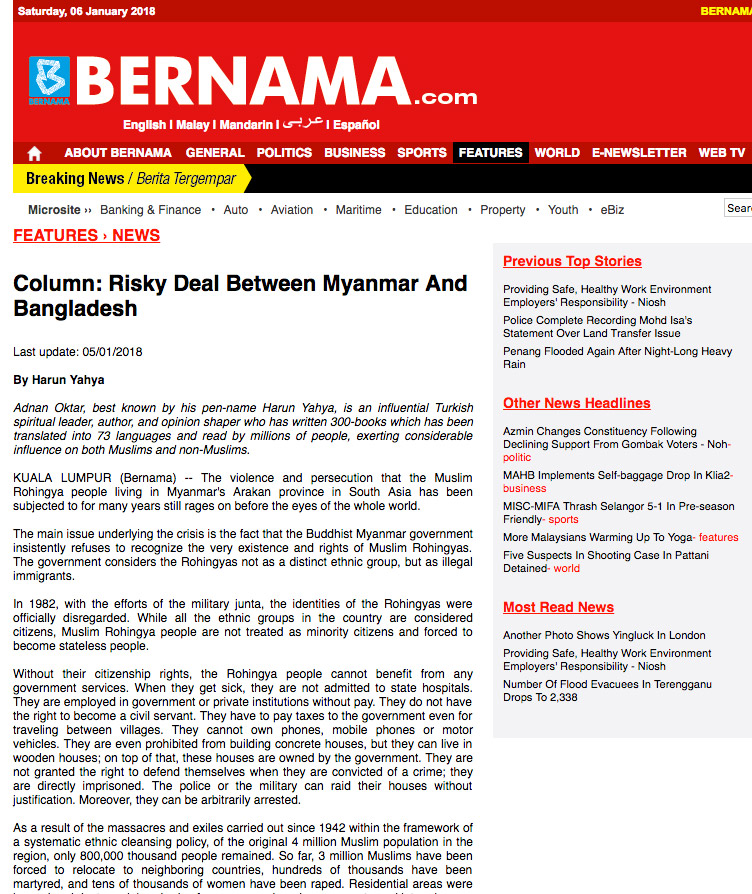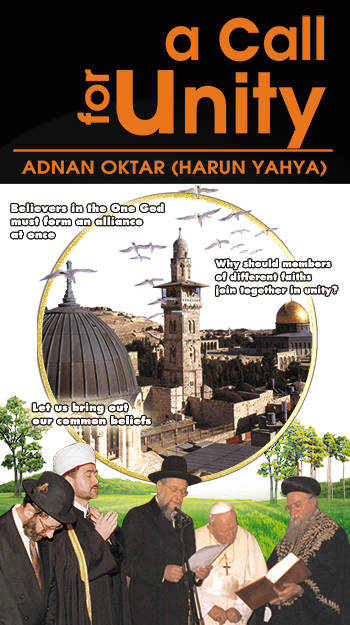Bigotry: The Dark Danger
Risky Deal Between Myanmar And Bangladesh

The violence and persecution that the Muslim Rohingya people living in Myanmar's Arakan province in South Asia has been subjected to for many years still rages on before the eyes of the whole world.
The main issue underlying the crisis is the fact that the Buddhist Myanmar government insistently refuses to recognize the very existence and rights of Muslim Rohingyas. The government considers the Rohingyas not as a distinct ethnic group, but as illegal immigrants and is trying to assimilate this community through all kinds of oppressive and dreadful practices. In 1982, with the efforts of the military junta, the identities of the Rohingyas were officially disregarded. While all the ethnic groups in the country are considered citizens, Muslim Rohingya people are not treated as minority citizens and forced to become stateless people.
Without their citizenship rights, the Rohingya people cannot benefit from any government services. When they get sick, they are not admitted to state hospitals. They are employed in government or private institutions without pay. They do not have the right to become a civil servant. They have to pay taxes to the government even for traveling between villages. They cannot own phones, mobile phones or motor vehicles. They are even prohibited from building concrete houses, but they can live in wooden houses; on top of that, these houses are owned by the government. They are not granted the right to defend themselves when they are convicted of a crime; they are directly imprisoned. The police or the military can raid their houses without justification. Moreover, they can be arbitrarily arrested.
As a result of the massacres and exiles carried out since 1942 within the framework of a systematic ethnic cleansing policy, of the original 4 million Muslim population in the region, only 800,000 thousand people remained. So far, 3 million Muslims have been forced to relocate to neighboring countries, hundreds of thousands have been martyred, and tens of thousands of women have been raped. Residential areas were burned and destroyed, hundreds of mosques and madrasas were turned into ruin.
During the rekindled attacks in recent months, Muslim villages, mosques and madrasas were set on fire and Muslims were burned alive in their homes. In the last week of August, between 2,000 and 3,000 Muslims were killed during attacks carried out by the separatist Arakan Rohingya Salvation Army. According to the European Rohingya Council Spokesperson Dr Anita Schug, all the men living in the Saugpara village of Rathedaung city of Arakan were killed and only a single boy survived.[1] As Abdul Fayaz, one of the Muslims living in the region, desperately said to Al Jazeera, women were raped by the soldiers, houses were burned down, and everything was set on fire.[2]
Following this, Muslim Rohingya people wanted to take refuge in Bangladesh to escape from the violent oppression they were subjected to. However, these 600,000 people were kept waiting at the border for days, under the rain and without food.
When they finally reached Bangladesh, they were still unable to find peace. They faced numerous problems in the camps established for them. Speaking at a conference for the Rohingya Refugee Crisis in Geneva, Dr. Joanne Liu, the President of Doctors Without Borders, stated that the camp is no different than a time bomb in terms of sanitary conditions and described the environment as follows: Rohingyas are living in makeshift shelters made of mud and plastic sheeting, fixed together with bamboo and scattered across little hilltops. When you move deeper into the settlement, you come across a wooded area with no roads. There are almost no services available. The vulnerability of people’s living conditions is shocking. Whole families are living under plastic sheeting in muddy and flood-prone terrain. They have very few belongings, are vulnerable to attacks from elephants. They have no access to clean water, latrines, food or healthcare."[3]
On top of all this, an agreement was recently signed between Bangladesh and Myanmar due to Bangladesh's persistent stance on sending Rohingya Muslims back to Myanmar. According to this agreement, Rohingyas could be sent back to Myanmar in two months. The question is, will they be able to find their houses intact when they go back? Of course not. They won't even be able to find their villages in the region completely destroyed by the army, let alone their houses.
The UN High Commissioner for Human Rights, Zeid Ra’ad al-Hussein, said in the emergency UN meeting at the Geneva headquarters on December 5th that the fact that Rohingya Muslims have been stateless for many years, subjected to discrimination, brutally displaced and their settlements have been systematically destroyed, points to an obvious attempt at ethnic cleansing. Asking, "Is there anyone who can claim that there are no genocide indicators in this situation?" Al-Hussein noted that an international criminal investigation on Rohingya is required. Stating that Myanmar security forces are treating the Rohingya minority barbarically based on eyewitness accounts, Al-Hussein also pointed out that all this must be taken into consideration and reminded attendees that so long as there are accounts of houses being intentionally set on fire, women and girls being raped, civillians being killed indiscriminately, and escapees being shot, it would be wrong to send Rohingya refugees in Bangladesh back to Myanmar. On the other hand, Al-Hussein stressed that the real causes of the crisis must be addressed and it must be guaranteed that basic human rights will be guaranteed.[4]
The statement of Al-Hussein is very important and entirely clear. It is unacceptable to send Rohingya Muslims back to Myanmar unless Myanmar’s government completely moves away from their cruel mentality. Myanmar must immediately end the oppression and violence Muslims have been subjected to in the country for over 60 years. Rohingya Muslims are the citizens of Myanmar, like Myanmar’s Buddhists, and have the right to live a beautiful, free and high-quality life in Myanmar. The Myanmar government can only find a place among the civilized countries of the world if it adopts this egalitarian attitude.
[1]http://www.yenisafak.com/en/world/nearly-3000-rohingya-muslims-killed-in-the-last-three-days-2787305
[2] https://www.youtube.com/watch?v=3Aac-LcAxok
[3] http://www.msf.org/en/article/bangladesh-opinion-rohingya-refugees-people-are-survival-mode
[4] http://www.dw.com/tr/bm-rohingyalara-soyk%C4%B1r%C4%B1m-yap%C4%B1l%C4%B1yor-olabilir/a-41663016
Adnan Oktar's piece in BERNAMA (Malaysia):
http://www.bernama.com/bernama/v8/fe/newsfeatures.php?id=1424762
2018-01-06 03:47:10






